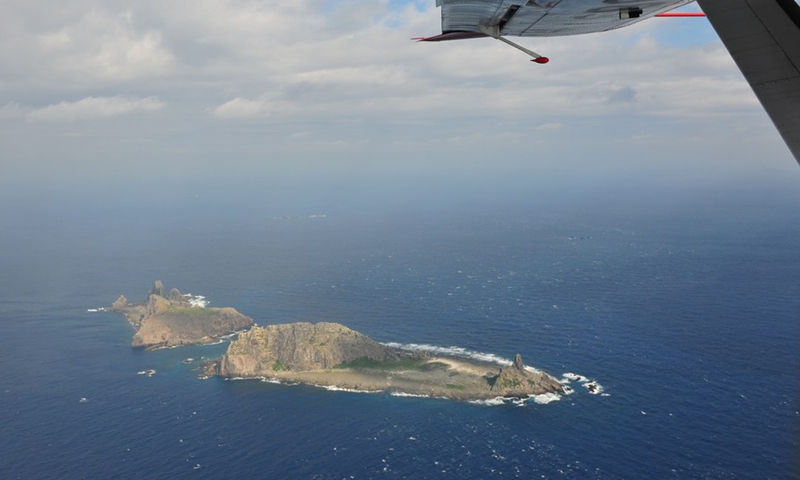Japan conducts maritime law enforcement drill with US, Philippines while ex-official hypes 'China threat'

File photo taken on a marine surveillance plane B-3837 shows the Diaoyu Islands and nearby islands. Photo: Xinhua
Japanese, the US, and Philippine maritime law enforcement agencies have conducted a new round of joint exercises this week in Japanese waters. Japan, which continuously engages in maritime actions along with other countries, has been propagating the "Chinese military threat" by closely monitoring the movements of Chinese aircraft carriers while an ex-official speculated about China's normal law enforcement actions near the Diaoyu Islands.
Following joint military exercises conducted last week in the South China Sea by Japanese and Philippine military forces, the Japan Coast Guard, the US Coast Guard, and Philippine Coast Guard are conducting their first trilateral joint training from Monday to Friday around Japan. According to Japan's Nikkei Shimbun, the exercises were aimed at addressing "increased Chinese activities" in the East China Sea and South China Sea, showcasing "solidarity among Japan, the US, and the Philippines."
The Diplomat reported on Wednesday that exercises scheduled for Friday include scenarios such as "simulated collision of two ships and subsequent rescue operations." The Philippine Coast Guard stated that the objective of the exercises was "to highlight operational readiness, coordinated response and reinforce regional cooperation in addressing maritime challenges." Nikkei Asia reported that the Philippine vessels participating in the exercises were funded and built by Japan for the Philippine Coast Guard, typically used to monitor Chinese vessels operating in the South China Sea.
Zhang Junshe, a Chinese military affairs expert, told the Global Times on Wednesday that in recent years, Japanese, the US, and Philippine navies, as well as maritime law enforcement agencies, have continuously conducted so-called joint exercises and patrols. This includes Japan's ongoing provision of weapons and equipment to the Philippines, ultimately aimed at "pushing" the Philippines to continue causing trouble in the South China Sea issue.
Zhang said that the continuous law enforcement patrols by Chinese Coast Guard near the Diaoyu Islands have exerted "pressure" on Japan, and Japan wants to incite the Philippines to stir up trouble in the South China Sea to divert China's "attention."
Zhang pointed out that the deep purpose of these so-called joint exercises is to coordinate with the US "Indo-Pacific strategy." "Japan is now one of the most active countries in cooperating with the US 'Indo-Pacific strategy,' often playing the role of 'organizer' to use maritime issues to try to restrict China," Zhang said.
South China Morning Post reported on Wednesday that Kiyofumi Iwata, former Chief of Staff of the Japan Ground Self-Defense Force, recently claimed in an interview with Japanese media that China's "increasingly aggressive actions" in the waters near the Diaoyu Islands are preparing for "landing and occupying the Diaoyu Islands."
According to reports, Iwata claimed that over the past two years, China's maritime presence around the Diaoyu Islands has continued to strengthen as China Coast Guard ships "frequently enter Japanese territorial waters", accusing China Coast Guard ships dispatched in May of using ship-borne helicopters to enforce rights near the Diaoyu Islands.
These remarks are completely irrelevant to China's normal law enforcement patrols and training activities, Zhang said. "Whether it is China safeguarding its rights in the waters around the Diaoyu Islands or conducting training exercises with aircraft carriers or other naval vessels in distant seas, these are our basic rights," Zhang said.
Japan's slander of China's normal law enforcement actions reflects its continued Cold War mentality toward China's development, attempting to restrict Chinese activities by hyping "China threat theory," Zhang noted.

